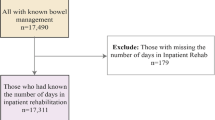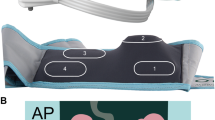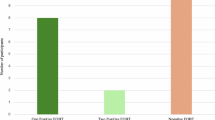Abstract
Background:
Cross-sectional studies suggest that colorectal dysfunction after spinal cord injuries (SCI) worsens as time goes by. However, follow-up studies are needed to prove this.
Study design:
Prospective study.
Objective:
To describe long-term colorectal function in SCI patients.
Setting:
Members of the Danish Spinal Cord Injuries Association.
Methods:
In 1996, 424 members of the Danish Paraplegic Association answered a detailed questionnaire describing their colorectal function. In 2006, those who continued as members (n=284) received an identical questionnaire. Data for patients responding both in 1996 and in 2006 (n=159) were compared.
Results:
In 1996, 25% of the respondents reported that colorectal dysfunction had some or a major impact on their quality of life. At follow-up 10 years later, it was 38% (P<0.005). In 1996 11% defecated less than every second day and 16% spent more than 30 min at each defecation; in 2006, it was 19% (P<0.01) and 25% (P<0.00001), respectively. Digital anorectal stimulation or evacuation was performed at least once every week by 48% in 1996 and by 56% in 2006 (P<0.0001). Fecal incontinence was reported at least once a month by 22% in 1996 and by 17% in 2006 (P<0.001).
Conclusion:
While the frequency and severity of constipation-related symptoms increase with time since SCI, there is a decrease in the frequency of fecal incontinence.
Similar content being viewed by others
Log in or create a free account to read this content
Gain free access to this article, as well as selected content from this journal and more on nature.com
or
References
Strauss DJ, DeVivo MJ, Paculdo DR, Shavelle RM . Trends in life expectancy after spinal cord injury. Arch Phys Med Rehabil 2006; 87: 1079–1085.
Mccoll MA, Walker J, Stirling P, Wilkins R, Corey P . Expectations of life and health among spinal cord injured adults. Spinal Cord 1997; 35: 818–828.
Whiteneck GG, Charlifue SW, Frankel HL, Fraser MH, Gardner BP, Gerhart KA et al. Mortality, morbidity and psychosocial outcomes of persons spinal cord injured more than 20 years ago. Paraplegia 1992; 30: 617–630.
Krogh K, Nielsen J, Djuurhus JC, Mosdal C, Sabroe S, Laurberg S . Colorectal function in patients with spinal cord lesions. Dis Colon Rectum 1997; 40: 1233–1239.
Stone JM, Nino-Murcia M, Wolfe VA, Perkash I . Chronic gastrointestinal problems in spinal cord injury patients: a prospective analysis. Am J Gastroenterol 1990; 85: 1114–1119.
Glickman S, Kamm MA . Bowel dysfunction in spinal-cord-injury patients. Lancet 1996; 347: 1651–1653.
Lynch AC, Wong C, Anthony A, Dobbs BR, Frizelle FA . Bowel dysfunction following spinal cord injury: a description of bowel function in a spinal cord-injured population and comparison with age and gender matched controls. Spinal Cord 2000; 38: 717–723.
Ng C, Prott G, Rutkowski S, Li Y, Hansen R, Kellow J et al. Gastrointestinal symptoms in spinal cord injury: relationships with level of injury and psychologic factors. Dis Colon Rectum 2005; 48: 1562–1568.
Mentor R, Weitzenkamp D, Cooper D, Bingley J, Charlifue S, Whiteneck G . Bowel management outcomes in individuals with long term spinal cord injuries. Spinal Cord 1997; 35: 608–612.
De Looze D, Van Laere M, De Muynck M, Beke R, Elewaut A . Constipation and other chronic gastrointestinal problems in spinal cord injury patients. Spinal Cord 1998; 36: 63–66.
Han TR, Kim JH, Kwon BS . Chronic gastrointestinal problems and bowel dysfunction in patients with spinal cord injury. Spinal Cord 1998; 36: 485–490.
Kirk PM, King RB, Temple R, Bourjaily J, Thomas P . Long-term follow-up of bowel management after spinal cord injury. SCI Nurs 1997; 14: 56–63.
Coggrave M, Wiesel PH, Norton C . Management of fecal incontinence and constipation in adults with central neurological diseases. Cochrane Database Syst Rev 2006; 19 CD002115.
Krogh K, Christensen P, Sabroe S, Laurberg S . Neurogenic bowel dysfunction score. Spinal Cord 2005; 44: 625–631.
Gore RM, Mintzer RA, Calenoff L . Gastrointestinal complications of spinal cord injury. Spine 1981; 6: 538–544.
Longo WE, Ballentyne G, Modlin IM . The colon, anorectum and spinal cord patient. A review of the functional alterations of the denervated hindgut. Dis Col & Rect 1989; 32: 261–267.
Haas U, Geng V, Evers GMC, Knecht H . Bowel management in patients with spinal cord injury—a multicentre study of the German speaking society of paraplegia (DMGP). Spinal Cord 2005; 43: 724–730.
Acknowledgements
The study was supported by The Ferdinand Salling Memorial Foundation. The practical help of the Danish Spinal Cord Injuries Association is appreciated.
Author information
Authors and Affiliations
Corresponding author
Rights and permissions
About this article
Cite this article
Faaborg, P., Christensen, P., Finnerup, N. et al. The pattern of colorectal dysfunction changes with time since spinal cord injury. Spinal Cord 46, 234–238 (2008). https://doi.org/10.1038/sj.sc.3102121
Received:
Revised:
Accepted:
Published:
Issue date:
DOI: https://doi.org/10.1038/sj.sc.3102121
Keywords
This article is cited by
-
Region-specific remodeling of the enteric nervous system and enteroendocrine cells in the colon of spinal cord injury patients
Scientific Reports (2023)
-
Are micro enemas administered with a squeeze tube and a 5 cm-long nozzle as good or better than micro enemas administered with a 10 cm-long catheter attached to a syringe in people with a recent spinal cord injury? A non-inferiority, crossover randomised controlled trial
Spinal Cord (2022)
-
MR defecography detects pelvic floor dysfunction in participants with chronic complete spinal cord injury
Spinal Cord (2020)
-
Neurogenic Bowel: Traditional Approaches and Clinical Pearls
Current Physical Medicine and Rehabilitation Reports (2020)
-
Long-term bladder and bowel management after spinal cord injury: a 20-year longitudinal study
Spinal Cord (2018)



